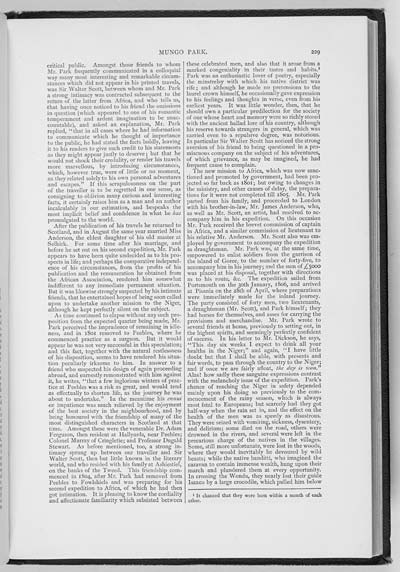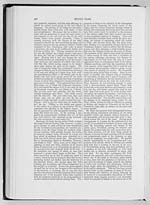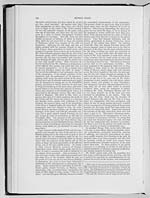229
critical public. Amongst those friends to whom
Mr. Park frequently communicated in a colloquial
way many most interesting and remarkable circum-
stances which did not appear in his printed travels,
was Sir Walter Scott, between whom and Mr. Park
a strong intimacy was contracted subsequent to the
return of the latter from Africa, and who tells us,
that having once noticed to his friend the omissions
in question (which appeared to one of his romantic
temperament and ardent imagination to be unac-
countable), and asked an explanation, Mr. Park
replied, "that in all cases where he had information
to communicate which he thought of importance
to the public, he had stated the facts boldly, leaving
it to his readers to give such credit to his statements
as they might appear justly to deserve; but that he
would not shock their credulity, or render his travels
more marvellous, by introducing circumstances,
which, however true, were of little or no moment,
as they related solely to his own personal adventures
and escapes." If this scrupulousness on the part
of the traveller is to be regretted in one sense, as
consigning to oblivion many curious and interesting
facts, it certainly raises him as a man and an author
incalculably in our estimation, and bespeaks the
most implicit belief and confidence in what he has
promulgated to the world.
After the publication of his travels he returned to
Scotland, and in August the same year married Miss
Anderson, the eldest daughter of his old master at
Selkirk. For some time after his marriage, and
before he set out on his second expedition, Mr. Park
appears to have been quite undecided as to his pro-
spects in life; and perhaps the comparative independ-
ence of his circumstances, from the profits of his
publication and the remuneration he obtained from
the African Association, rendered him somewhat
indifferent to any immediate permanent situation.
But it was likewise strongly suspected by his intimate
friends, that he entertained hopes of being soon called
upon to undertake another mission to the Niger,
although he kept perfectly silent on the subject.
As time continued to elapse without any such pro-
position from the expected quarter being made, Mr.
Park perceived the imprudence of remaining in idle-
ness, and in 1801 removed to Peebles, where he
commenced practice as a surgeon. But it would
appear he was not very successful in this speculation;
and this fact, together with the natural restlessness
of his disposition, seems to have rendered his situa-
tion peculiarly irksome to him. In answer to a
friend who suspected his design of again proceeding
abroad, and earnestly remonstrated with him against
it, he writes, "that a few inglorious winters of prac-
tice at Peebles was a risk as great, and would tend
as effectually to shorten life, as the journey he was
about to undertake." In the meantime his ennui
or impatience was much relieved by the enjoyment
of the best society in the neighbourhood, and by
being honoured with the friendship of many of the
most distinguished characters in Scotland at that
time. Amongst these were the venerable Dr. Adam
Ferguson, then resident at Hallyards, near Peebles;
Colonel Murray of Cringletie; and Professor Dugald
Stewart. As before mentioned, too, a strong in-
timacy sprung up between our traveller and Sir
Walter Scott, then but little known in the literary
world, and who resided with his family at Ashiestiel,
on the banks of the Tweed. This friendship com-
menced in 1804, after Mr. Park had removed from
Peebles to Fowlshiels and was preparing for his
second expedition to Africa, of which he had then
got intimation. It is pleasing to know the cordiality
and affectionate familiarity which subsisted between
these celebrated men, and also that it arose from a
marked congeniality in their tastes and habits.1
Park was an enthusiastic lover of poetry, especially
the minstrelsy with which his native district was
rife; and although he made no pretensions to the
laurel crown himself, he occasionally gave expression
to his feelings and thoughts in verse, even from his
earliest years. It was little wonder, then, that he
should own a particular predilection for the society
of one whose heart and memory were so richly stored
with the ancient ballad lore of his country, although
his reserve towards strangers in general, which was
carried even to a repulsive degree, was notorious.
In particular Sir Walter Scott has noticed the strong
aversion of his friend to being questioned in a pro-
miscuous company on the subject of his adventures,
of which grievance, as may be imagined, he had
frequent cause to complain.
The new mission to Africa, which was now sanc-
tioned and promoted by government, had been pro-
jected so far back as 1801; but owing to changes in
the ministry, and other causes of delay, the prepara-
tions for it were not completed till 1805, Mr. Park
parted from his family, and proceeded to London
with his brother-in-law, Mr. James Anderson, who,
as well as Mr. Scott, an artist, had resolved to ac-
company him in his expedition. On this occasion
Mr. Park received the brevet commission of captain
in Africa, and a similar commission of lieutenant to
his relative Mr. Anderson. Mr. Scott also was em-
ployed by government to accompany the expedition
as draughtsman. Mr. Park was, at the same time,
empowered to enlist soldiers from the garrison of
the island of Goree, to the number of forty-five, to
accompany him in his journey; and the sum of �5000
was placed at his disposal, together with directions
as to his route, &c. The expedition sailed from
Portsmouth on the 30th January, 1806, and arrived
at Pisania on the 28th of April, where preparations
were immediately made for the inland journey.
The party consisted of forty men, two lieutenants,
a draughtsman (Mr. Scott), and Park himself; they
had horses for themselves, and asses for carrying the
provisions and merchandise. Mr. Park wrote to
several friends at home, previously to setting out, in
the highest spirits, and seemingly perfectly confident
of success. In his letter to Mr. Dickson, he says,
"This day six weeks I expect to drink all your
healths in the Niger;" and again, "I have little
doubt but that I shall be able, with presents and
fair words, to pass through the country to the Niger;
and if once we are fairly afloat, the day is won."
Alas! how sadly these sanguine expressions contrast
with the melancholy issue of the expedition. Park's
chance of reaching the Niger in safety depended
mainly upon his doing so previously to the com-
mencement of the rainy season, which is always
most fatal to Europeans; but scarcely had they got
half-way when the rain set in, and the effect on the
health of the men was as speedy as disastrous.
They were seized with vomiting, sickness, dysentery,
and delirium; some died on the road, others were
drowned in the rivers, and several were left in the
precarious charge of the natives in the villages.
Some, still more unfortunate, were lost in the woods,
where they would inevitably be devoured by wild
beasts; while the native banditti, who imagined the
caravan to contain immense wealth, hung upon their
march and plundered them at every opportunity.
In crossing the Wondu, they nearly lost their guide
Isaaco by a large crocodile, which pulled him below
1 It chanced that they were born within a month of each
other.

![]() Universal Viewer |
Universal Viewer | ![]() Mirador |
Large image | Transcription
Mirador |
Large image | Transcription
![]()

